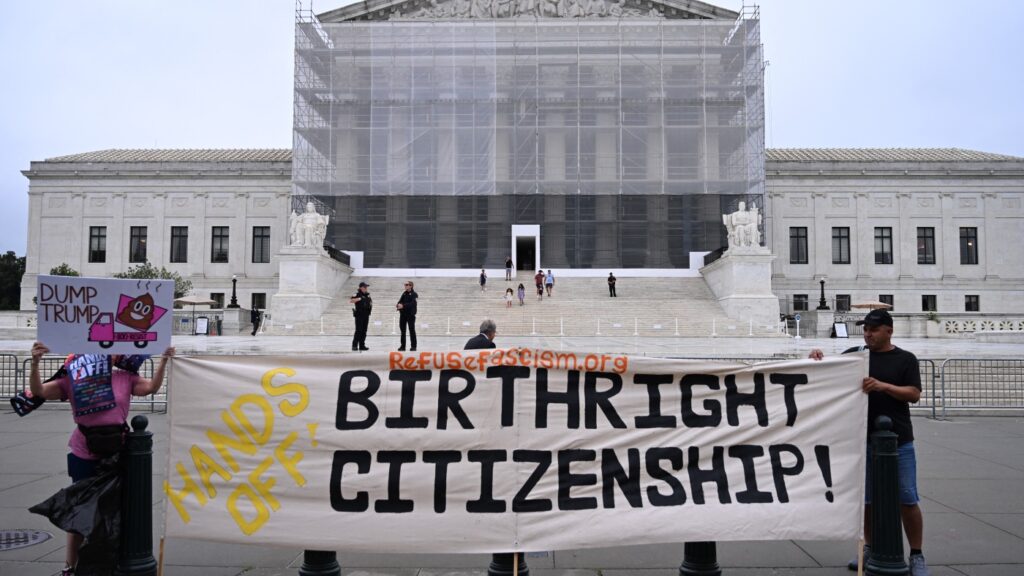
Demonstrators holds up an anti-Trump sign outside the US Supreme Court in Washington, DC, on June 27, 2025. The Supreme Court is to issue its final rulings on Friday ahead of its summer break, including cases involving birthright citenzenship, porn site age verification, students and LGBTQ-themed content, and voting rights. US President Donald Trump said Friday he can now push through a raft of controversial policies after the Supreme Court handed him a "giant win" by curbing the ability of lone judges to block his powers nationwide. In a 6-3 ruling stemming from Trump's bid to end birthright citizenship, the court said nationwide injunctions issued by individual district court judges likely exceed their authority. (Photo by Alex WROBLEWSKI / AFP) (Photo by ALEX WROBLEWSKI/AFP via Getty Images)
After the Supreme Court issued a ruling that limits the ability of federal judges to issue universal injunctions, immigrant rights groups are mobilizing a new strategy. Although the ruling did not address the legality of former President Trump’s executive order on birthright citizenship, it has prompted a national class action lawsuit. This lawsuit seeks to protect the citizenship rights of children born in the U.S. to undocumented immigrants.
The lawsuit was filed on behalf of two immigrant rights organizations, whose members include individuals without legal status in the United States. These individuals “have had or will have children born in the United States after February 19, 2025,” according to court documents. William Powell, senior counsel at the Institute for Constitutional Advocacy and Protection at Georgetown Law, explained that the class action approach aims to secure comprehensive relief for those affected by the executive order.
Legal Maneuvering in the Wake of the Ruling
The strategic shift required three court filings: one to add class allegations to the initial complaint, a second to move for class certification, and a third asking a district court in Maryland to issue “a temporary restraining order or preliminary injunction” for the putative class. The amended complaint, filed shortly after the Supreme Court’s ruling, argues that Trump’s attempt to end birthright citizenship could undermine the citizenship status of thousands of children nationwide.
“The Executive Order threatens these newborns’ identity as United States citizens and interferes with their enjoyment of the full privileges, rights, and benefits that come with U.S. citizenship,” the complaint states. The executive order, issued on Trump’s first day in office, claims, “the Fourteenth Amendment has never been interpreted to extend citizenship universally to everyone born within the United States.”
Implications of the Supreme Court’s Decision
Rights groups and 22 states had previously asked federal judges to block Trump’s executive order. However, after three federal district court judges issued universal injunctions preventing its enforcement, the Trump administration appealed to the Supreme Court to eliminate such injunctions entirely. Although the Supreme Court did not rule on the birthright issue itself, Trump hailed the decision as a “monumental victory for the Constitution, the separation of powers, and the rule of law.”
The ruling has raised questions about the future of birthright citizenship and how the limitation on universal injunctions might affect other executive policies. “Nationwide injunctions have been an important tool to prevent blatantly illegal and unconstitutional conduct,” stated Keren Zwick, director of litigation at the National Immigrant Justice Center. She warned that limiting these injunctions “opens a pathway for the president to break the law at will.”
Historical Context and Future Outlook
The concept of birthright citizenship is rooted in the English common law principle of jus soli (“right of the soil”). This doctrine was temporarily disrupted by the infamous Dred Scott decision but was reinstated with the ratification of the 14th Amendment in the 1860s. The amendment declares, “All persons born or naturalized in the United States, and subject to the jurisdiction thereof, are citizens of the United States.”
Wendy Weiser, vice president for democracy at the Brennan Center for Justice at NYU Law School, emphasized, “Any executive order purporting to limit birthright citizenship is just as unconstitutional today as it was yesterday.” She added that the Supreme Court’s decision does not undermine lower court opinions on the matter but limits judicial tools to enforce constitutional mandates.
The Supreme Court’s ruling sets a 30-day timeframe for the policy outlined in Trump’s executive order to take effect. Justice Amy Coney Barrett’s majority opinion highlighted the distinction between “complete relief” and “universal relief,” suggesting that prohibiting enforcement against an individual plaintiff’s child would suffice for that plaintiff’s relief.
“Extending the injunction to cover all other similarly situated individuals would not render her relief any more complete,” Barrett wrote.
In dissent, Justice Sonia Sotomayor expressed concern that the ruling implies constitutional guarantees might not apply to those not directly involved in a lawsuit.
As the debate over birthright citizenship continues, the legal community and immigrant rights advocates await further developments. Attorney General Pam Bondi indicated that the issue might return to the Supreme Court this fall, leaving the future of birthright citizenship in a state of uncertainty.




